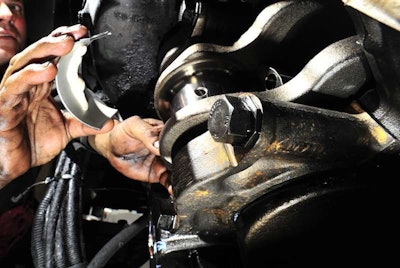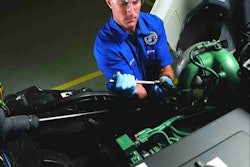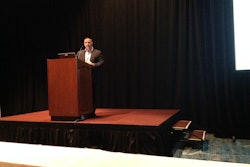
The agreement allows carriers to have work done on their trucks and engines at the repair shop of their choosing, regardless of its affiliation with a truck manufacturer.
The agreement will ensure that vehicle owners and independent repair facilities have access to the OEM-controlled service information, tools and parts that they need to properly repair commercial vehicles. The MOU also memorializes the current industry practice of providing diagnostic tool information to third-party aftermarket tool manufacturers, thus providing owners with service options when maintaining or repairing vehicles.
“The MOU establishes a workable approach to providing an independent service provider with access to information they need to repair heavy-duty vehicles properly and safety,” says Jed Mandel, EMA president. “The MOU was developed to address concerns expressed by independent service providers that they have better and more timely access to OEM-controlled information. The MOU helps ensure that access, thereby eliminating any need for state, provincial or federal regulation.”
Marc Karon, president at Total Truck Parts and chairman of the Commercial Right to Repair Coalition, sponsored by CVSN and representing independent service providers across the U.S., says the MOU is a huge accomplishment for both parties.
“With today’s complex, computer-controlled heavy-duty vehicles, having access to the correction information and latest diagnostic tools is essential to being able to complete repairs for our customers. The MOU addresses our need for reasonable access to OEM service information and diagnostic tools. I am pleased that we were able to finalize a practical and workable solution through the MOU process.”
Under the terms of the MOU, the participating industry associations will work together to monitor the exchange of service information and address any information access issues with the goal of helping to ensure that vehicles are properly and safely maintained with the correct parts and tools.
“One of the significant benefits of the MOU is that it addresses the unique characteristics of the heavy-duty vehicle manufacturing industry, as well as the special needs of the independent heavy-duty repair shops,” Mandel says. “With that accomplished, we can avoid a patch-work and potentially disruptive effort to regulate service information through government action.”
“We were able to craft an MOU that benefits independent repair facilities and OEMs, as well as our join customers—heavy-duty vehicle owners and operators,” adds Dave Scheer, CEO at Inland Truck Parts and longtime advocate of independent provider access to service information.











